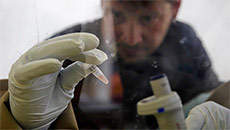LONDON - A new study underscores the potential danger of airplane passengers infected with Ebola leaving West Africa: If there were no exit screening in place, researchers estimate that three people with the disease might fly out of the region each month.
The hardest-hit West African nations have been checking passengers since summer, but the new work is a reminder of how much easier it could be for the virus to travel outside the outbreak region if those measures weren't in place — and that screening can't catch every case.
Since the Ebola outbreak was first identified in March, there have been only two known exported cases involving flights, one before and one after screening began in Liberia.
A Liberian-American flew to Nigeria in July and sparked a small outbreak there, which has since been contained. The second man, Liberian Thomas Eric Duncan, passed a screening when he left for the U.S. last month; he didn't have a fever or symptoms until days after arriving in Dallas.
For the study, researchers used international flight data and Ebola case tallies to calculate that — without screening — three infected people a month could fly out of the region. They noted that screening isn't foolproof: It can take up to three weeks for people exposed to Ebola to develop symptoms, so it is likely some cases will slip through.
The out-of-control epidemic has killed an estimated 4,500 people.
"As the outbreak grows, we will be seeing more international exportations of Ebola," said Dr. Kamran Kahn of St. Michael's Hospital in Toronto, the study's senior author.
He added that disaster could strike if people with Ebola fly to less developed countries. "What might happen if cases were to wind up in a slum in Nairobi or Mumbai?"
Kahn noted that there were few flights from the West Africa nations of Guinea, Sierra Leone and Liberia even before the outbreak. He and his colleagues calculated that countries most at risk of getting imported Ebola cases are the nearby Ghana and Senegal, followed by Britain and France.
The U.S. was significantly further down the list, followed by India, Kenya and Germany. The study was published online Monday in the journal Lancet.
"There are more and more cases of Ebola every week so the risk of exportation is also increasing every week," said Benjamin Cowling of the School of Public Health at the University of Hong Kong, who co-authored a commentary.
"Maybe the one case exported to Texas was just bad luck. Or maybe there are more cases travelling as we speak," he said.
U.S. health officials earlier this month said airport screening in West Africa had stopped 77 people from boarding planes, none with Ebola but some had malaria.
Some American lawmakers have called for a ban on travellers from West Africa. At a European Union meeting on Monday, foreign ministers scrapped the idea of a ban, reasoning people from West Africa would simply go elsewhere en route to Europe. In the meantime, the U.S. and other countries are now checking travellers from West Africa.
Health officials have repeatedly said the only way to stop exported cases is to stop the epidemic in West Africa.
"As long as Ebola continues to spread in Africa, we can't make the risk zero here," said Dr. Tom Frieden, director of the U.S. Centers for Disease Control and Prevention.





